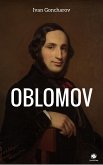In his seminal work "Oblomov," Ivan Aleksandrovich Goncharov crafts a poignant narrative that explores the themes of inertia, identity, and the socio-political landscape of 19th-century Russia. The novel's titular character, Ilya Oblomov, embodies a profound existential malaise, a sense of lethargy that reflects the broader cultural stagnation of the Russian aristocracy. Goncharov'Äôs literary style deftly blends realism with rich character studies, employing a subtle, ironic tone that invites readers to ponder the consequences of inaction in a rapidly changing world. Through Oblomov'Äôs struggles and relationships, particularly with the spirited Olga, Goncharov critiques both the individual'Äôs responsibility and the societal expectations that bind them. Ivan Aleksandrovich Goncharov, born into a noble family in 1812, became a prominent figure of Russian literature with his nuanced understanding of human psychology and social dynamics. His experiences in both rural and urban settings, combined with his travels, significantly influenced his portrayal of the Russian gentry. Goncharov's keen observation of society'Äôs transformations, alongside his own frustrations with complacency, underpin the character of Oblomov, making the narrative not only a personal reflection but also a broader commentary on his time. "Oblomov" is an essential read for those keen on exploring the complexities of human nature and the societal constructs that shape existence. This novel resonates with readers today, serving as a reminder of the perils of inertia and the importance of engagement in our lives. It is a powerful lens through which one can examine personal and collective identity in the face of changing landscapes.
Dieser Download kann aus rechtlichen Gründen nur mit Rechnungsadresse in A, B, BG, CY, CZ, D, DK, EW, FIN, F, GR, H, IRL, I, LT, L, LR, M, NL, PL, P, R, S, SLO, SK ausgeliefert werden.









